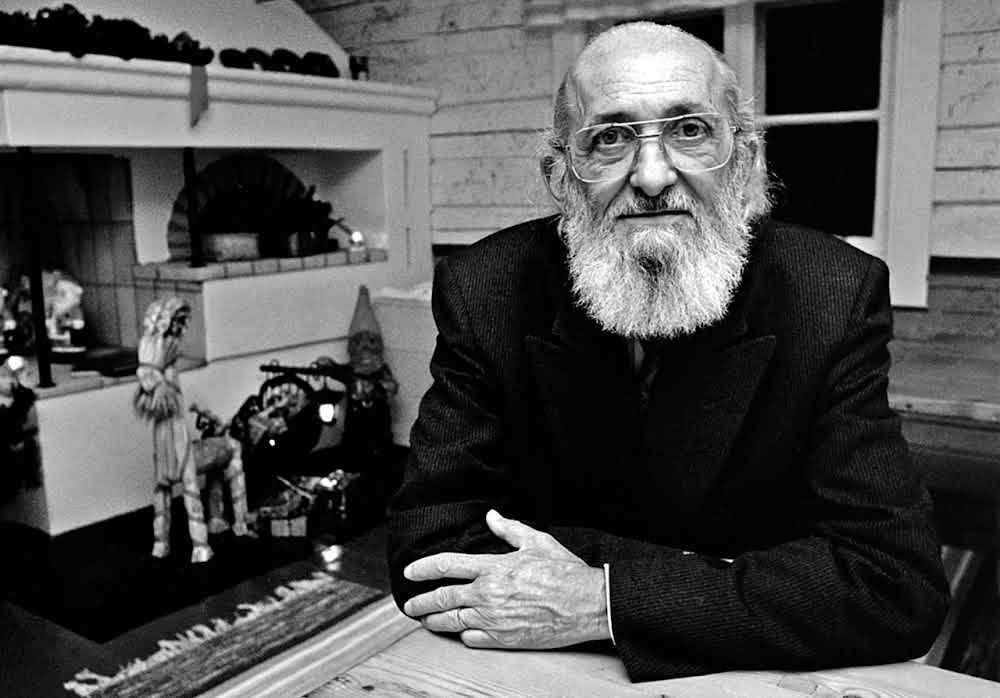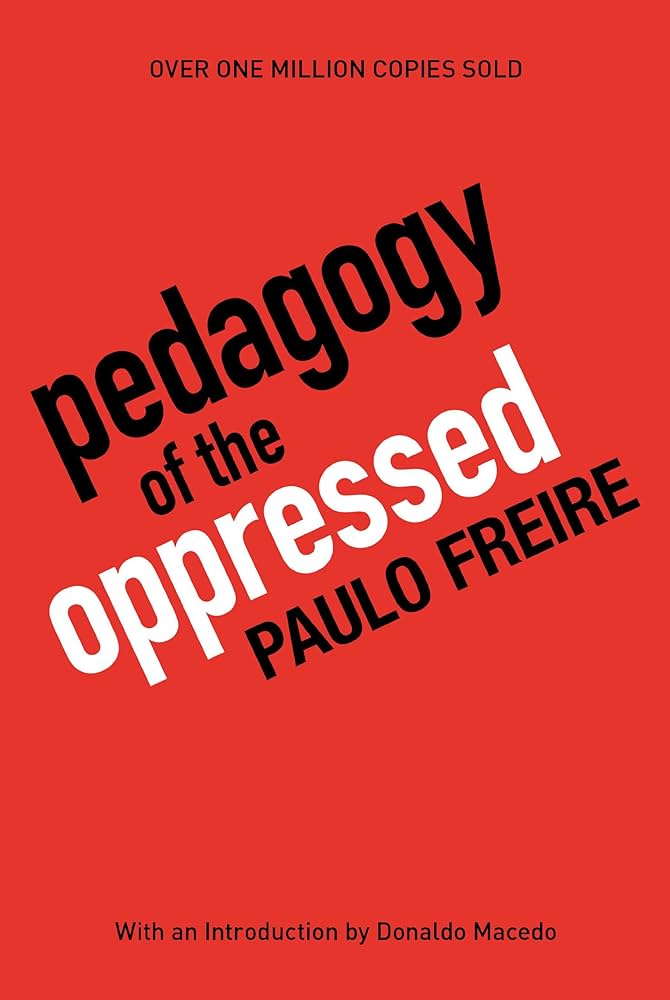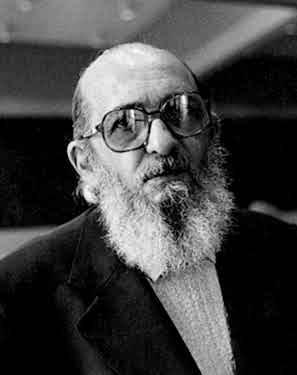
Paulo Freire was an activist, philosopher and educator born in Brazil in 1921. His radical ideas on social reform have had a profound influence in the fields of education and community development around the world. The philosophical and political principles outlined in his books set forth the basis of ‘Liberation Pedagogy’ – education that could grant the oppressed masses a means by which they could understand their own social circumstances and work actively to change society for the better.
The most notable of his works was entitled ‘Pedagogy of the Oppressed’. In this text, you can find many of the ‘avant-garde’ ideas of progressive educationalists that are now coming back into fashion, such as the centrality of relationships between teachers and learners, the importance of active learning styles like problem-based learning, and dialogic teaching to instil critical thinking skills.
Freire’s experiences of growing up in poverty during the Great Depression greatly influenced his concerns for the poor, as well as the way in which he viewed education. As a Marxist and a humanist, Freire viewed society through a lens of class struggle. Specifically, he examined the relationship between oppressed and oppressors. The key problem for a nationwide liberation movement, as Freire saw it, was that through years of social injustice of living under an oppressive hegemony, the poor had inevitably ended up internalising their oppression; for a poor man to become a realised man, it meant to become like the oppressor.
He understood that a poor person may strive for the power and freedom of a rich person without ever considering that the rich were losing their own humanity through the oppression of the poor. If the peasants were yearning for agrarian reform, they did so not for the liberation of the masses, but that they themselves could become landowners and bosses over other workers.
Freire expounded his idea as a peasant becoming promoted to an overseer, who must surely be as tough on his former co-workers as the boss to ensure standards and quotas were satisfied to protect his new elevated status. The poor had grown with a ‘fear of freedom’, where the oppressed mind shied away from the dangers of liberating ideas in preference to their own personal security, which culminated in a culture of silence and a fatalistic acceptance of the status quo.
The question Freire posed was this:

‘How can the oppressed, as divided, unauthentic beings, participate in developing the pedagogy of their liberation? Only as they discover themselves to be “hosts” of the oppressor can they contribute to the midwifery of their liberating pedagogy.’
He believed that, with proper guidance, this cycle of oppression could be broken through education:
‘This can be done only by means of the praxis: reflection and action upon the world in order to transform it.’
Education, in Freire’s mind, could never be a neutral process; a student either passively receives it or actively engages in the learning process. In his texts, Freire heavily critiques the problems of traditional education as a tool for the oppressing class. Its primary purpose was not for the education and uplifting of the masses but rather for maintaining and reinforcing the status quo.
Freire refers to the traditional norms of education and academia as ‘banking education’, in which facts are passively deposited into the minds of students. In this scenario, the teacher, regarded as an all-knowing benefactor, imparts knowledge to the students, empty vessels considered to be totally devoid of knowledge. The success of this form of education is measured by how well students are able to receive, store and recount facts and information as though they were tellers at a bank.
By this means a student becomes ‘domesticated’ for society. The classroom mirrors an oppressive society, in which the students are trained to become docile, to accept what they are told by their betters without questioning and expected to meekly accept their lot in life. In this way, banking education maintains and even stimulates an oppressive hegemony, assimilating the younger generation into it using typical attitudes and practices in the classroom that are mirrored throughout larger society.
For instance: teachers teach, students are taught; the teacher is considered knowledgeable, but the students are ignorant; when the teacher speaks, the students listen; the teacher determines the lesson plan, and the students (who have no say) adapt to it. Teachers discipline and the students are disciplined; the teacher makes a decision and enforces it, and the students follow it; it is the teacher who acts and the students who have the illusion of acting through the actions of the teacher; the teacher conflates their professional authority with the authority over subject knowledge, by which they stand in opposition to the freedom of the pupil.
In this method the teacher works towards moulding the minds of students to better conform to the oppressive system outside the school walls, as the better the student can be taught to adapt to that situation, the easier it is for a ruling class to dominate them and protect the status quo.
Freire reminds us, however, that the true reality stands in opposition to the false consciousness of oppression; that the poor are not marginals living on the fringes of society, but are in fact the foundations upon which the ruling class have built an ivory tower of wealth and controlling power.
In banking education, students are not required to fully grasp the subject matter being taught, but to memorise and recite facts and statistics delivered by the all-knowing teacher. The intellectual problem is that, in this process of learning, the students use few of their cognitive faculties and are never encouraged to discover themselves as beings in the process of becoming fully human. In this system, the subject matter is the sole property of the teacher who has conflated it with his own professional authority, not a learning medium that promotes critical reflection upon the subject matter from both teachers and students.
Freire argues: ‘Projecting an absolute ignorance onto others (a characteristic of the ideology of oppression) negates education and knowledge as processes of inquiry.’ For Freire, true teacher-student dialogue cannot exist if teachers consider students as ignorant and devoid of knowledge.

In response to this, Freire suggests the use of critical thinking and problem-posing to encourage student participation – an antithesis of banking education. In his own words: ‘Problem-posing education bases itself on creativity and stimulates true reflection and action upon reality’. It is the rejection of communiqués and is instead the embodiment of communication between teacher and student. In Freire’s ideal learning environment, people teach each other through discussion, mediated by the subject matter and by the world. In this way, he redresses the imbalance and contradictions between teacher and student.
The students, who are no longer treated as passive recipients, are encouraged to engage in open discussions and debates with the teacher and their fellow classmates. During class, the teacher presents the material to the class for discussion and rethinks their initial considerations in response to the students expressing their own. The students can now play an active role in their own learning as ‘critical co-investigators’ of the subject matter.
Freire describes the intellectual ambition of this radical style of learning thusly: ‘The role of the problem-posing educator is to create; together with the students, the conditions under which knowledge at the level of the doxa is superseded by true knowledge, at the level of the logos’.
Learners are increasingly challenged with problems related to themselves and the environment around them. Thus, they can develop a greater understanding of problems and subject material interrelated within a larger context. During his work, Freire found that the resulting level of student understanding became increasingly critical and consistently less alienated from reality. In essence, the questions and material were no longer purely theoretical but part of a tangible comprehension of the world.
Students were not only increasingly challenged but also increasingly capable of responding to that challenge. Banking education typically submerges and shackles creative thinking but Freire’s ‘problem-posing’ education incorporated a ‘constant unveiling of reality’ that had direct implications for the lives of the students, allowing for the development of a conscientious mind capable of reflection and action upon reality – the key to Freire’s ‘Revolutionary Praxis’.
Freire recognises that for subjugated individuals to apply a ‘revolutionary praxis’ in their studies and further afield, they need to first properly understand their current social and economic circumstances – for instance, firstly by recognising that they are undereducated, then gaining an understanding of their political system in which the rich minority dominates the poor majority, with a view to ultimately realising they have the power to change society by themselves by acting upon their knowledge for a positive change.
He discusses the concept of conscientisation, or conscientização; a term which goes beyond simple awareness-raising and refers to an effort for the poor to regain their humanity. Conscientisation involves becoming aware of social and political contradictions in our society and then linking that knowledge to the necessary action in the praxis that can be used to reform society’s oppressive power structures. In this process, one must first develop a critical attitude that allows us to understand and analyse the human relationships and political systems that govern us.
As a person becomes more conscious, they become more aware of their own social, economic and political context, including elements such as gender, social class, sexuality and race, and how these factors play out in our lives and the lives of others. As we develop critical consciousness, we become aware of our agency in shaping the world around us.
Freire, for example, worked with agrarian labourers who were the descendants of African and Indigenous slaves. Many lived and worked under almost the same conditions as their enslaved ancestors. Freire’s approach helped these people – considered totally ignorant by the standards of banking education – to recognise, understand and critique unjust aspects of their circumstances. These included factors arising from racism, colonialism and Brazilian capitalism that had become embedded in their society over generations. Freire understood that for meaningful change to take place against unjust systems of governance, these forces must be properly recognised and understood by the people.

Whereas banking education reinforced the false consciousness of oppression and strengthened naïve perceptions in the poor about their own ignorance, problem-posing education allows for the critical reflection upon their own circumstances as an object of cognition. It aimed to empower them to overcome the limits of their upbringing, granting them the ability to shape their own future wisely for the betterment of themselves and their society. In this way, both teachers and students become subjects of the learning process by overcoming an authoritarian classroom and disregarding the intellectualism prevalent throughout society.
Freire’s Marxist beliefs are clearly evident in his texts. Freire’s theories on education are all inseparably interwoven with his unconquerable belief in Marxist revolution and a liberation movement. In his writings, the two themes wind together, supporting and nourishing each other like a strand of DNA. Problem-posing education aimed to change the way the masses, primarily consisting of the working class, were educated. Its ambition was to draw out knowledge from the students, creating a new generation of inquisitive minds across all strata of society with a keen thirst for knowledge but also compassion for the suffering of their fellow man.
The final goal, of course, was the liberation of the oppressed masses.
The political potential of this approach made him a target for the authorities. In the 1960s he was scapegoated, accused of politicising the masses and threatening the status quo by provoking a revolution. This led to his arrest and subsequent exile in Chile. During his years in exile, Freire was welcomed by the Chilean people and was able to complete the manuscript for his first book: ‘Education as the Practice of Freedom’, published in 1967 and followed by his most critically acclaimed work, ‘Pedagogy of the Oppressed’ (1968) based on his experiences in Brazil and Chile.
The exile of Paulo Freire lasted for almost 16 years, between 1964 and 1980. From that time, he returned to Brazil, where he worked as an educator until his death in 1997.
Freire is regarded as one of the founding figures of critical pedagogy in modern education. His views on adult literacy in ‘Education as the Practice of Freedom’ paved the way for new ideas about literacy and education in modern schooling.
‘Pedagogy of the Oppressed’ (1968) cemented these foundations for a new approach to education. Today, it has been translated into 17 languages and has influenced educators all around the globe. Even now, In the 21st century, some consider it too subversive for reading. As recently as 2010 it was banned in the state of Arizona as a measure to prevent the overthrow of the American government.
In 18 countries, the Paulo Freire Institute has been established to promote pedagogical dialogue and research into education. Latin America, Africa, Asia, the Philippines, India and Papua New Guinea are among the countries and continents that have widely adopted Freire’s emancipatory teaching model. Ironically, the World Bank Group currently funds literacy campaigns globally based on Freirean pedagogy.
In spite of Freire’s writings being primarily informed by the educational and economic circumstances of his time in Brazil in the early 20th century, his ideologies have proven to be globally applicable thanks in part to his experiences in exile teaching a diverse array of ethnic groups. Thus, his insights can be applied to a multitude of contexts. For example, his methodology helped modernise the abhorrent state of Black education in the USA in the wake of the civil rights movement.
His work offers a practical means for developing a critical consciousness with the right skillset to facilitate social justice, and people can recognise the value in this aim regardless of geographic borders and cultural differences.
Many teachers now advocate Freire’s ideas and pedagogical approaches without realising that they are, at least in part, the result of his work – and herein lies the danger. In taking these ideas out of their political and activist context and making them acceptable to current political and educational mainstream systems, they too become ‘domesticated’ and no longer part of a pedagogy of the oppressed. One must hope that once students start discussing and critically appraising their own situation and that of society, a genie is released that can’t be put back in the bottle.
For further reading, Freire’s most notable works include:
- Freire, P. (1970). Pedagogy of the Oppressed. New York, Continuum.
- Freire, P. (1970). Cultural Action for Freedom. [Cambridge], Harvard Educational Review.
- Freire, P. (1973). Education for Critical Consciousness. New York, Seabury Press.
- Freire, P. (1975). Conscientization. Geneva, World Council of Churches.
- Freire, P. (1976). Education, the Practice of Freedom. London, Writers and Readers Publishing Cooperative.
- Freire, P. (1978). Pedagogy in Process: The Letters to Guinea-Bissau. New York, A Continuum Book: The Seabury Press.
- Freire, P. (1985). The Politics of Education: Culture, Power, and Liberation. South Hadley, MA, Bergin & Garvey.
- Freire, P. & D.P. Macedo (1987). Literacy: Reading the Word & the World. South Hadley, MA, Bergin & Garvey Publishers.
- Freire, P. & I. Shor (1987). Freire for the Classroom: A Sourcebook for Liberators Teaching.
- Freire, P. and H. Giroux & P. McLaren (1988). Teachers as Intellectuals: Towards a Critical Pedagogy of Learning.
- Freire, P. & I. Shor (1988). Cultural Wars: School and Society in the Conservative Restoration, 1969–1984.
- Freire, P. (1993). Pedagogy of the City. New York, Continuum.
- Faundez, Antonion, and Paulo Freire (1992). Learning to Question: A Pedagogy of Liberation. Trans. Tony Coates, New York, Continuum.
- Freire, P. and A.M.A. Freire (1994). Pedagogy of Hope: Reliving Pedagogy of the Oppressed. New York, Continuum.
- Freire, P. (1997). Mentoring the Mentor: A Critical Dialogue with Paulo Freire. New York, P. Lang.
- Freire, P. & A.M.A. Freire (1997). Pedagogy of the Heart. New York, Continuum.
- Freire, P. (1998). Pedagogy of Freedom: Ethics, Democracy and Civic Courage. Lanham, Rowman & Littlefield Publishers.
- Freire, P. (1998). Politics and Education. Los Angeles, UCLA Latin American Center Publications.
- Freire, P. (1998). Teachers as Cultural Workers: Letters to Those Who Dare Teach. Boulder, CO, Westview Press.